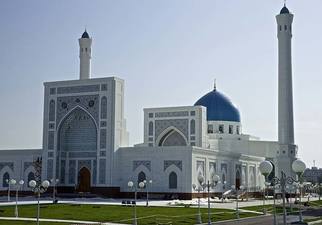The Legislative Chamber posted a draft Concept of national policies on religious freedom of individuals has been posted for public input.
Common terms
The Concept has defined the goals, objectives, principles and priority areas of national policies in the religious sphere, as well as the embodiment of constitutional provisions on freedom of conscience and the secular nature of the state.
The document underscored that it was developed taking into account the rich national and historical experience and universal human values and was aimed at ensuring a stable environment in which the multi-confessional and multi-ethnic society of Uzbekistan can develop on the principles of democracy, secularism, freedom, equality, social justice and unity.
According to the updated Constitution, Uzbekistan is a sovereign, democratic, legal, social and secular state. Article 35 of the Constitution guarantees freedom of conscience for all. Everyone has the right to profess any religion or not to profess any. Forced imposition of religious views is unacceptable.
“Freedom of conscience as a constitutional right can be fully realized only in a secular state. A secular state creates the necessary social environment for respect, protection and harmonious development of religious values and beliefs,” the draft Concept emphasizes.
The document also describes the background and current state of ensuring freedom of conscience in Uzbekistan.
As noted, the legal framework in this area was laid in the early 1990s with the adoption of the Freedom of Conscience and Religious Organizations Law (1991) and the Constitution (1992).
“At the same time, the intensification of illegal activities of radical, extremist and terrorist groups motivated by religious prejudices in Central Asia, including their attempts to create a clerical state, created threats to the constitutional right of individuals to freedom of conscience,” the document emphasizes. Under these conditions, a new version of the Law on Freedom of Conscience and Religious Organizations was adopted in 1998.
After 2017, Uzbekistan stepped up efforts to ensure religious freedom, interfaith harmony and support for national and religious values, the document further underscored.
The state actively participated in the reconstruction of historical, religious and cultural sites, many mosques and churches were built and restored, and individuals freely perform religious rites in them. Religious holidays are freely held.
Conditions have been created for pilgrimage tourism. The Hajj quota for Uzbekistan has been increased threefold, and the restriction on performing Umrah has been completely lifted.
The Council for Confessional Affairs, which includes the leaders of all faiths in the country, began its activities.
Challenges and risks
Meanwhile, there are threats in this area, such as:
- attempts to impose religious norms in public relations regulated by laws;
- attempts to question the equality of rights between men and women;
- refusal to perform civic duties for religious reasons;
- ignoring social norms, national and universal values;
- restriction of rights to medical care, use of scientific and cultural achievements, as well as access to goods and services;
- incomplete understanding by some civil servants of the essence of a secular state;
- dissemination of illegal ideas that threaten the development of society, unity and stability.
In addition, the globalization of the information space and the growth of youth migration limit control over factors that contribute to radicalization, the draft concept states.
The absence of clear principles of national policies in the religious sphere can lead to different interpretations and distorted interpretations of the foundations of a secular state, the growth of contradictions in society and the ignoring of scientific and technological achievements, the project emphasizes.
The goal of the national policies of Uzbekistan in the religious sphere is to create equal conditions for individuals to exercise their right to freedom of conscience, strengthen interfaith harmony, ensure religious tolerance and secularism of society.
The main objectives of the national policies in the religious sphere:
- ensuring equality of all individuals before the law regardless of gender, race, nationality, language, religion, beliefs, social origin and status. Elimination of any discrimination on these grounds;
- strengthening the unity and tolerance of the multinational and multi-confessional people of Uzbekistan;
- reliance on the principle of secularism in the formation of the domestic and foreign policy of the state;
- prohibition of civil servants from giving preference to any religion or discriminating against individuals on religious grounds when performing official duties;
- ensuring the secular nature of public administration, civil service, armed forces, law enforcement agencies, self-government of individuals and other institutions of society;
- supporting interreligious dialogue and preventing the violent imposition of religious beliefs;
- combating radicalization, spreading extremist and terrorist ideas, protecting the rights, freedoms and legitimate interests of individuals, as well as public order.
The principles of national policies in the religious sphere include legality, freedom of conscience, separation of religion from the state, equality, freedom of thought and expression (individuals have the right to freely express their views if they do not violate the rights of others, the legitimate interests of society and the state), dialogue and mutual understanding.
According to the document, the state guarantees freedom of conscience of individuals and creates organizational and legal conditions for the legal activities of religious organizations. Coordination of interaction between government agencies and religious structures is envisaged, as well as cooperation in matters of safe pilgrimage trips and religious ceremonies.
To counter religious radicalization, steps are envisaged to combat extremism and terrorism, including through social adaptation of individuals influenced by radical movements. Work will also be intensified to identify and prevent the spread of destructive ideology in the information space.
Special attention is paid to information security: measures will be taken to restrict access to Internet resources that disseminate extremist materials and those inciting national, racial, ethnic or religious hatred.
Areas for building a Secular State
The priority areas for the development of a secular state are defined as the spheres of public administration, regulation of the economy, education, medicine and culture, as well as in the sphere of the institution of marriage and public morality and ethics.
Secularism in public administration involves the adoption and implementation of management decisions based on the Constitution and laws, taking into account national and universal values, cultural heritage, public interests and scientifically based approaches.
This means preventing the influence of religious beliefs of employees of government agencies, armed forces and law enforcement agencies on their professional activities and performance of functional duties, ensuring the independence of the judiciary from national, racial, political or religious influence, etc.
Secularism in economic regulation means that public policy and economic relations should be based on empirical data, rational analysis, objective observations and recognized economic laws.
A secular approach to education assumes that the learning process, its organization and provision of educational services are based on scientific knowledge and logical thinking, free from religious dogmas and beliefs. It is aimed at developing students' respect for the diversity of views, national and universal values, as well as their contribution to social development.
This implies preventing restrictions on compulsory education on any grounds, developing the scientific and intellectual potential of young people, respect for national values and public moral norms, maintaining religious neutrality in the education system, preventing the forced imposition of religious views, and so on.
Secularism in medicine consists of organizing the public healthcare, providing medical services and developing a medical culture based on scientific research, evidence-based medicine, medical ethics and the priority of individuals' rights to health care.
This involves using only clinically and scientifically proven treatment methods in medical practice, preventing obstacles to medical intervention based on religious beliefs, and developing an understanding among individuals that unscientific treatment methods cannot replace modern medical technologies.
A secular approach in the sphere of culture consists of developing society in accordance with the principles of humanism, respect for the natural environment, national and universal cultural heritage. This is manifested in the support of traditions, literary and musical art, choreography, theater, cinema and other forms of artistic creativity.
Secularism in the regulation of marital relations means the legal regulation of marriage on the basis of civil and family legislation. This refers to the mandatory state registration of marriage before religious ceremonies, strict adherence to the principle of voluntary consent to marriage, a ban on polygamy and polygamous marriages, support for traditional marital relations in accordance with national values and legislation.
The secular approach to the formation of social norms of morality and behavior is that each person, regardless of their personal beliefs, behaves reasonably in relations with other people and society, respects their rights and freedoms, including the right to freedom of conscience. The basis of this approach is the ideas of humanism, national and universal values.
Expectations from the implementation of the concept
As a result of the implementation of the tasks envisaged by the concept, the following results are expected to be achieved:
- creation of conditions for the implementation of the constitutionally guaranteed right of individuals to freedom of religion or renunciation thereof;
- strengthening the rule of law in society, increasing the effectiveness of the protection of constitutional rights and freedoms of individuals;
- ensuring social cohesion, unity and preventing possible conflicts through preventive measures;
- improving legislation regulating secularism, eliminating legal gaps and contradictions;
- minimizing factors that impede the implementation of the principles of a secular state;
- ensuring freedom of religion in a secular state;
- development of the organizational and legal foundations of the model of interaction between the state and religious denominations on the principles of religious tolerance and interfaith harmony;
- improving the system of training specialists in the field of religion and religious studies, taking into account the improvement of their qualifications, etc.















